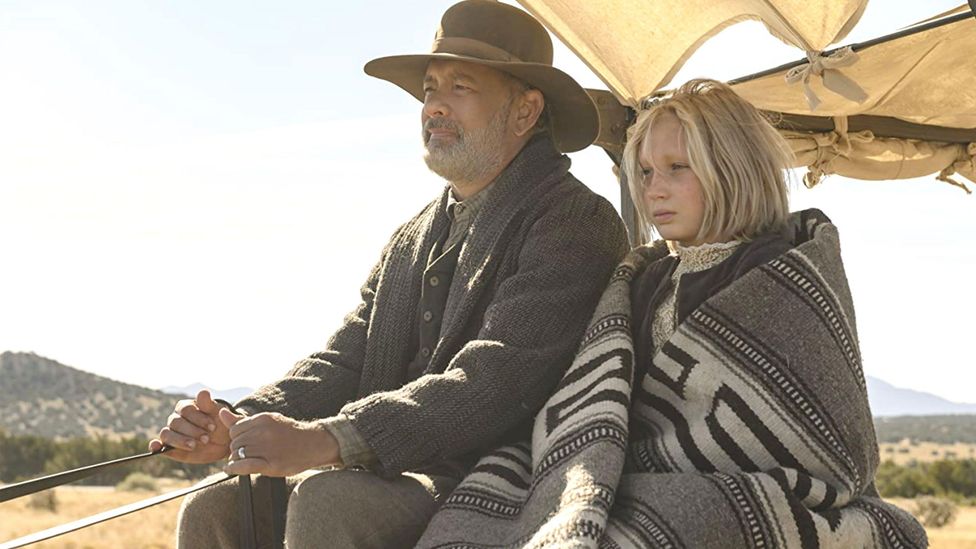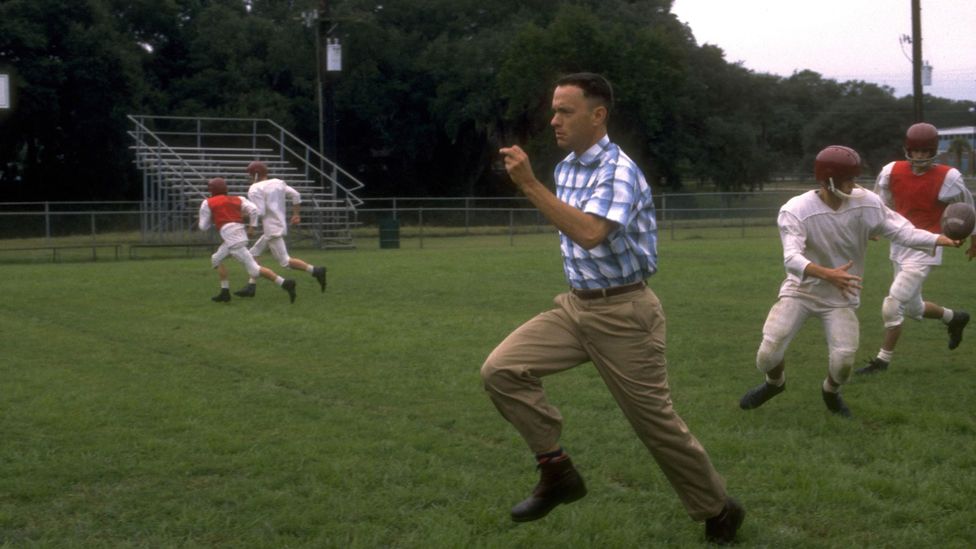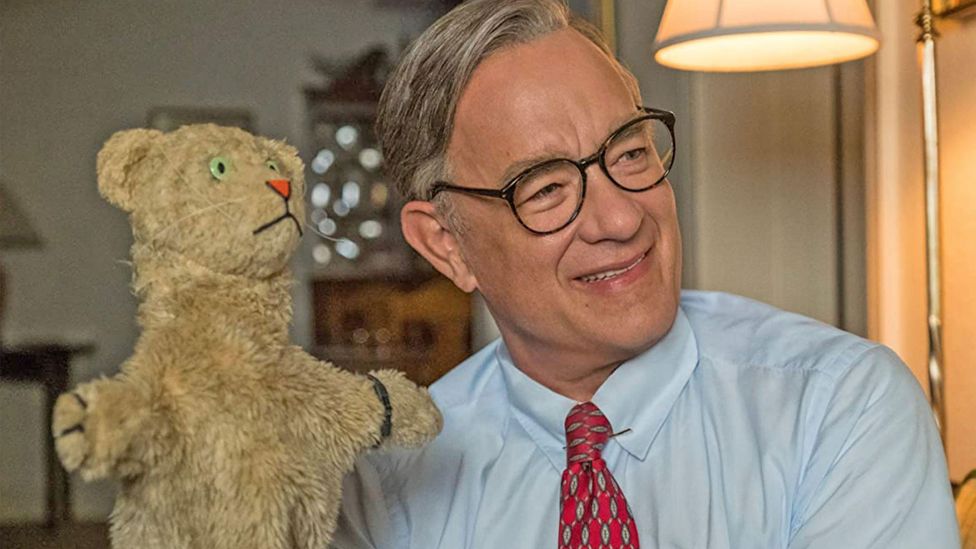At the age of 64, and now entering his fifth decade on our movie screens, Tom Hanks has settled into the role of a movie star who could be called cinema's resident dad. With a reputation for being as nice in real life as you might hope, Hanks has aged into a paternal, white-bearded presence, with the concomitant boomer-friendly roles to go with it.
More like this:
– A beautifully old-fashioned Western
– Ten films to watch in February
– How dogs help men open up on screen
His two most recent films are last year's Greyhound, a Hanks-penned World War Two thriller in which he plays a submarine commander, and now News of the World, a Western set in the years immediately following the close of the US Civil War, directed by Paul Greengrass, which is premiering around the world on Netflix tomorrow.

In new Western News of the World, Hanks plays an army veteran traversing the Texas hinterlands to reunite an orphan girl with her family (Credit: Alamy)
In the film, Hanks is a veteran traversing the Texas hinterlands during the Reconstruction period when he stumbles upon a lost young white girl (Helena Zengel) who only speaks Sioux, and is forced to undergo a dangerous journey to bring the orphan to her family. Hanks shepherds the young girl to safety – first brusquely, and then with a sudden outburst of affection made all the more poignant for the way it is reserved previously. He once again reminds us, quite literally, that he is in many ways the ultimate dad.
The aging star system
The fact is, "dad" is a designation you could assign – at least in terms of age – to many of Hollywood's biggest male actors. In recent years, much has been made of the lack of new heavyweight male star power in mainstream Hollywood. Talented performers may be everywhere, but Movie Stars, capital M, capital S, are something else. They're the ones with definitive personas, with a forcefield around them that invariably pulls audiences into their orbit. They have the self-deprecating good humour of Dwayne "The Rock" Johnson, or the gravitas and dignity of Denzel Washington. When you can refer to someone's new movie as, simply, "the new Tom Hanks", you know they're a movie star.
But they do seem to be aging out. There's Leonardo DiCaprio at 46, Johnson, at 48 years old, and Brad Pitt, at 57; Tom Cruise, at 58. The others are older again, with Washington at 66, two years older than Hanks himself. It makes you wonder where the new crop of male movie stars under 40 will come from, and if they will arrive at all. It could be to do with the myriad ways in which star-making and the industry itself has altered since the 1980s and 1990s, or with changing attitudes around masculinity, or the fine line between ‘persona’ and typecasting, with actors often wary of the latter. It makes Tom Hanks' whole type – his entire breed – feel increasingly rare.
From the early days of his career in Penny Marshall's hit body-swap comedy Big (1988), Hanks has had the look of the everyman. That pleasantly familiar face, with its mischievous brown eyes and oft-furrowed brow, has taken him through several phases of his career, from goofy comedy to prestige drama (an era cemented by his two-year-on-the-trot best actor Oscar win for Philadelphia and Forrest Gump) to elder statesman of the big US history movie. Off camera, he also frequently gets involved in bringing to the screen projects around this great passion of his, telling the story of his nation, such as the punishing HBO World War Two series Band of Brothers, which he executive produced.
As far as star identity goes, Hanks has always had a disarming openness about him, with features that seem ready-made to convey a combination of sturdy heroism and a capacity for wonder. That slightly wide-eyed boyishness has given him a career playing ordinary people in extraordinary circumstances, whether that be everyone's favourite idiot-savant Forrest Gump (1994), a pilot who saves the day in Sully (2016), or the beleaguered Captain Miller of Saving Private Ryan (1998). Often, those roles are based on real people; Hanks is known as being an avid reader of history and biography, and seems to seek out stories which offer a certain optimism and humanism. In other words, he plays – fundamentally – good people.

Hanks has always had a proclivity for playing ordinary people in extraordinary circumstances, as in his 1994 hit Forrest Gump (Credit: Alamy)
He can play unlikeable, but he’s rarely the villain. He's the FBI agent antagonist in Catch Me if You Can (2002) opposite a buoyantly charming young Leonardo DiCaprio as con artist Frank Abagnale, but his character is more of a determined cat to Leo's mouse than a real foil; he's simply a prim Eisenhower-era man with a job to do. In A League of Their Own (1992), as the shouty baseball coach to an all-girls team, he's once again a curmudgeonly but lovable mentor figure. In Sam Mendes's excellent gangster movie Road to Perdition (2002), he tested the boundaries further playing a hitman – but while we know he's a killer, we never really see him go full-pelt hoodlum. The film mostly sees him through the gaze of his young son, which can't help but soften the impression somewhat. Even when he's bad, he's kind of good.
Hanks has often been called our generation's answer to James Stewart, and the similarities are certainly there. With his shared "gee shucks" sweetness and apple pie Americanness, Stewart also appeared in many war films and family dramas. The difference is that in the second half of his career, Stewart inched towards the sinister via his work with directors like Alfred Hitchcock and Anthony Mann. His postwar roles, full of myopic obsession, stalkerish derangement, and a desire for vengeance, don't seem like ground Hanks is willing to cover. For his part, he told the New York Times in 2019 that he didn’t feel he could conjure up the requisite malevolence to play certain roles. Maybe he was right: does anyone really want to see Tom Hanks do a heel turn?
An unfashionable icon
The double-edged sword of movie stardom remains the same as it ever was: when a persona is so fixed in the public mind, it's what people love you for, and it becomes difficult to deviate from. You become at risk of leaning too far into a successful pattern, and the work becomes predictable, even mediocre. Hanks' taste in projects and directors is undoubtedly patrician and with a few exceptions like 1993's Philadelphia, the first mainstream film about the Aids crisis, rarely provocative; he's made five movies with Spielberg and several with both Ron Howard and Robert Zemeckis, all admirable but often staid filmmakers with a professed love of the Capra-esque. (Meanwhile, misfires like the eminently creepy animated film Polar Express and actively bad Coen Brothers Ealing comedy remake The Ladykillers show just how wrong this can go.) It's for this reason that some regard Hanks with a sniffy attitude, seeing his middlebrow Hollywood fare as unfashionable (yes) and reactionary (no).
Recently on Twitter, an argument cropped up over whether Tom Hanks had actually been in any good movies. Contrarian as that might seem to the casual moviegoer, and as outrageous as it may be to me in particular, the assertion was interesting. The fact of the matter is that Hanks' persona is so larger-than-life at this stage that many people who love him – especially younger people – do so not because he's an actor they admire, but because he's a lovable pop culture figure: the voice of Woody in Toy Story; someone they've grown up with. News goes viral about him doing nice things for strangers, about his adorable typewriter collection, about him comforting crying journalists and there has to be something particularly sour in you to not like the man, even if you’re not really up for a rewatch of Forrest Gump anytime soon.

A recent career highpoint was his performance as US children's TV icon Mister Rogers in A Beautiful Day in the Neighbourhood (Credit: Alamy)
Hanks can – and has – been analysed in a less flattering light, not so much because of anything he's done or said but because of the ways his image can be interpreted. His placid but stalwart vision of male authority is a kinder, gentler one than we're used to seeing, but some might argue all the more insidious for that reason: a reassuring endorsement of white male righteousness and paternalism from someone whose career was born out of the Reaganite 1980s, an era that liberal critics would say was the acme of similar values. It may be true that Hanks likes to play stiff-spined but trustworthy authority figures, including soldiers and cops and politicians. Sometimes, that might mean that he plays the sort of roles that my (read: millennial) generation are well-placed to dislike. But then, if Tom Hanks is the collective boomer dad of moviedom, he was always bound to have some rebellious offspring.
And while all of this is worth considering, it also seems to fall wide of the mark when you actually… watch many of his movies, or are capable of seeing them individually rather than dismissing them collectively. In News of the World, there is a satisfyingly slow-burn depiction of chaotic, violent life in a Texas viciously divided by the Civil War and still simmering with class and race resentment, as Americans of all kinds – white, Native, and black – attempt to co-exist. The implications about the US today are pretty self-evident.
There's also the fact that when he's at his best, Hanks is hard to outshine. There are those outstanding final moments in real-life hostage drama Captain Phillips (2013), about the hijacking of a US merchant ship by Somali pirates, in which his traumatised mariner is moved to near-hysteria by his ordeal; his gentle, soft-spoken directness as US children's TV icon Mister Rogers, in Marielle Heller’s A Beautiful Day in the Neighbourhood (2019); the red-eyed but dignified calm of his astronaut commander Jim Lovell in Apollo 13 (1995), telling his fellows it's been a privilege to fly with them as he steels himself for death; even his tragicomic muffled coughs as a man with a perennial cold in Bridge of Spies (2015).
Hanks is representative of a potentially dying breed: a good, old-fashioned movie star whose "real life", whatever that may be, seems curiously, almost magically aligned to his gentlemanly image. Blurring these boundaries between on and off-screen personae is part of the fabric of star power. In our deeply cynical times, where celebrities have fewer and fewer secrets, that is an increasingly rare thing to see. It makes Hanks a movie star we can wholeheartedly believe in – a man who emanates such earnest warmth that it's difficult to imagine his legacy will be anything but enduring.
News of the World is available now to rent in the US on streaming platforms, and is released on Netflix around the world on 10 February.
Love film and TV? Join BBC Culture Film and TV Club on Facebook, a community for cinephiles all over the world.
If you would like to comment on this story or anything else you have seen on BBC Culture, head over to our Facebook page or message us on Twitter.
And if you liked this story, sign up for the weekly bbc.com features newsletter, called The Essential List. A handpicked selection of stories from BBC Future, Culture, Worklife and Travel, delivered to your inbox every Friday.
"movie" - Google News
February 09, 2021 at 07:09AM
https://ift.tt/2LxfCgd
Is Tom Hanks part of a dying breed of genuine movie stars? - BBC News
"movie" - Google News
https://ift.tt/35pMQUg
https://ift.tt/3fb7bBl
Bagikan Berita Ini














0 Response to "Is Tom Hanks part of a dying breed of genuine movie stars? - BBC News"
Post a Comment